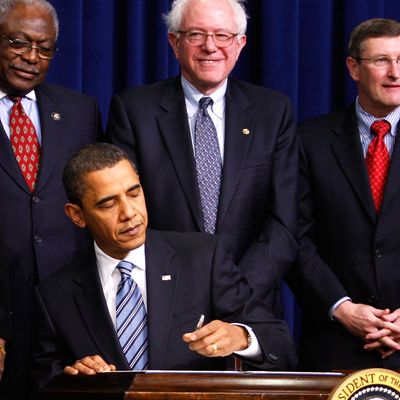
When faced with attacks from Bernie Sanders — on her financial ties to Wall Street, her foreign-policy record, her positions on health care and financial regulation — Hillary Clinton has tied herself to President Obama. Campaign reporters have generally interpreted this reflex as a pure campaign tactic, using a president popular with the party base as a shield against Sanders’s populist thrusts. And it is that, in part. But it also cuts to the heart of perhaps the most fundamental rift within the Democratic primary: Has the Obama presidency been a rousing success, or a disappointment?
Progressive dismay has stalked the Obama administration from the very beginning, when liberals bemoaned the $787 billion stimulus, signed into law a few weeks into Obama’s presidency, as underwhelming. Essays like this one by Rick Perlstein, bemoaning the Obama presidency as a lost opportunity, appear regularly. The liberal pundit Bill Press has a new book, Buyer’s Remorse: How Obama Let Progressives Down, the thesis of which is self-explanatory. One blurb reads, “Bill Press makes the case why, long after taking the oath of office, the next president of the United States must keep rallying the people who elected him or her on behalf of progressive causes. That is the only way real change will happen. Read this book.” The author of the blurb is none other than Bernie Sanders.
To say the least, I do not share that assessment. As I wrote in 2011, every Democratic president from Roosevelt’s time onward has faced disenchantment from the base, which inevitably regards the president as an uninspiring compromiser. Liberal disappointment is a natural, even inevitable, feature of Democratic presidencies, and Sanders’s disposition toward Obama reflects the sentiment many members of his party feel. He does not dislike the president — indeed, his personal regard for him outstrips his assessment of his prowess. Nor does he oppose Obama’s program (Sanders reliably voted with Obama in Congress) or even consider him hapless. His indictment is that Obama has achieved very little.
That assessment is widely shared by Sanders’s constituency. New Hampshire Democratic-primary voters who want the next president to continue Obama’s policies supported Clinton by 25 percent; those who prefer the next president “change to more liberal policies” went for Sanders by a 63 percent margin. It is not actually true that Sanders has inspired an unusually enthusiastic turnout — Democrats this year cast fewer votes in both New Hampshire and Iowa than they did in 2008. (This fact, by the way, cast doubt on Sanders’s claim that he can upend Washington by inspiring mass turnout at the polls.) This suggests that disillusionment with the status quo may matter more than any positive attachment to Sanders.
And the premise that Obama mainly tinkered around the margins is the foundation upon which Sanders’s candidacy rests. When Sanders says it is “too late for Establishment politics,” he is grouping together Clinton, the Obama administration, and Republicans into the single category of the Establishment. Sanders does not deny the existence of conflict within “the Establishment,” but he dismisses its importance. And he has attracted and embraced caustic left-wing Obama critics, like Cornel West. Instead, the conflict he frames as central is the one pitting big, monied interests, which corrupt all Establishment politicians to varying degrees, against the people.
Sanders’s fixation with reversing Citizens United, which gutted campaign-finance restrictions, provides an important window into the different perspective he has on Obama-era politics. Other Democrats have denounced the Supreme Court ruling, but Sanders presents it as nothing less than a turning point in American history, which has left in place a government that is “just an oligarchy, with unlimited political bribery being the essence of getting the nominations for president or to elect the president.” Sanders is implying that the six years since Citizens United have been a period of tightening oligarchy rather than, as Obama would see it, one of liberal reform.
The differing assessments of the Obama presidency likewise frame their differing approaches to electability. As Ed Kilgore notes, the small minority of Democrats who prioritize a candidate who can win in November favor Clinton overwhelmingly. Clinton has presented electability as vital for vouchsafing the Obama legacy. All the Republican candidates, Establishment and anti-Establishment alike, have committed to repealing Obamacare, Dodd-Frank, tax increases on the rich, and Obama’s climate regulations. If you consider these reforms a towering liberal achievement, then protecting them is a worthy ambition for a president (who will otherwise face a Republican Congress opposed to anything liberal), and the risk of losing is too great to bear.
But if, on the other hand, you see Obama’s achievement as tepid half-measures, then the risk of having them reversed is not terribly frightening — and the gamble must be taken if the only real thing at stake is revolutionizing the political system. The Democratic primary will be fought over the question of whether the Obama presidency proved that progressive reform within the system is possible, or whether it proved the opposite.






























